最新译林英语6B知识点归纳
(完整版)译林英语6B知识点归纳,推荐文档.docx
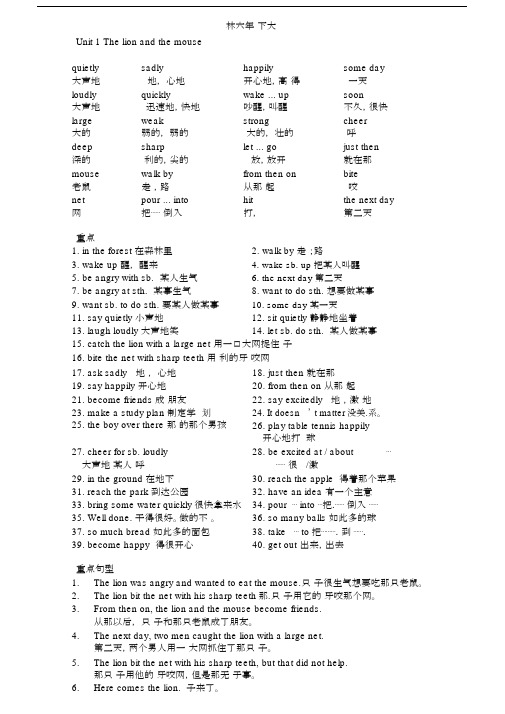
林六年下大Unit 1 The lion and the mousequietly sadly happily some day大声地地,心地开心地,高得一天loudly quickly wake ... up soon大声地迅速地,快地吵醒,叫醒不久,很快large weak strong cheer大的弱的,弱的大的,壮的呼deep sharp let ... go just then深的利的,尖的放,放开就在那mouse walk by from then on bite老鼠走,路从那起咬net pour ... into hit the next day网把⋯⋯倒入打,第二天重点1. in the forest 在森林里2. walk by 走;路3. wake up 醒,醒来4. wake sb. up 把某人叫醒5. be angry with sb. 某人生气6. the next day 第二天7. be angry at sth. 某事生气8. want to do sth. 想要做某事9. want sb. to do sth. 要某人做某事10. some day 某一天11. say quietly 小声地12. sit quietly 静静地坐着13. laugh loudly 大声地笑14. let sb. do sth. 某人做某事15.catch the lion with a large net 用一口大网捉住子16.bite the net with sharp teeth 用利的牙咬网17. ask sadly 地,心地18. just then 就在那19. say happily 开心地20. from then on 从那起21. become friends 成朋友22. say excitedly 地,激地23. make a study plan 制定学划24. It doesn ’ t matter没关.系。
新译林 6B Unit6 An interesting country 知识点梳理
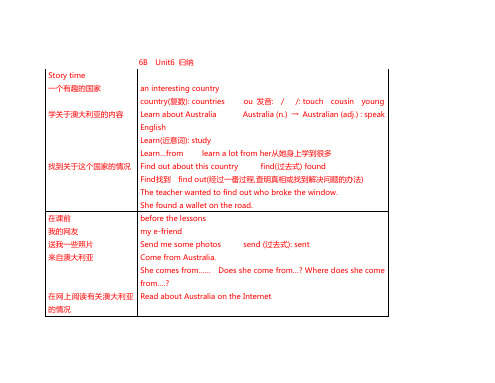
常见时间状语:tomorrow, tomorrow afternoon, next week, in a year(一年后), this evening
他们将要去野餐。
否定句
一般疑问句,肯否回答
他们将要做什么?
他们将要在何时何地野餐?
She found a wallet on the road.
在课前
before the lessons
我的网友
my e-friend
送我一些照片
Send me some photos send (过去式): sent
来自澳大利亚
Come fromAustralia.
She comes from……Does she come from…? Where does she come from….?
黄石国家公园
Yellowstone National Park (in the US在美国)
巨石阵
Stonehenge (in theUK)
大堡礁
the Great Barrier Reef (inAustralia)
我想成为一名厨师
I want to be a cook.
查找有关烹饪的知识
find out about cooking
Fun time
告诉你有关英国的情况
tell you about theUK
UK
Big Ben大本钟London Eye伦敦眼Tower Bridge塔桥
Sound & Culture& Cartoon
新鲜的空气
fresh air
它的景色很美
译林(苏教)版6B各单元知识归纳

6B各单元知识点Unit 1 Who is younger?一、四会要求:1、单词:A.than 比chat 闲谈、聊天also也、还so所以twin双胞胎之一(twins双胞胎), minute分钟(复数形式minutes), only 唯一的;仅有的, child 孩子(复数形式children)B.形容词和它们的比较级:tall高(taller), long长(longer), short矮、短(shorter),young年轻的、年纪小(younger), old年长、年老、旧的(older),fat胖(fatter), thin瘦(thinner),big大(bigger), small小(smaller),heavy重(heavier), light轻(lighter),strong强壮(stronger)C.动词和它们的过去式:meet--met, sit--sat, have,has—had,go—went2、词组:on Sunday morning在周日早晨have a chat闲谈、聊天,as tall as me/ him/her…和我/他/她一样高,go for a walk去散步(take a walk散步)meet me/him/them 遇见……/和……见面want to meet her想要见见她be very glad to see them很高兴看见他们sit down under a big tree坐在大树下(比较级)than……比……更……one year younger than me比我小一岁twenty minutes younger than me比我小二十分钟one day 某一天look the same看起来一样,看起来很像the only child in your family你家里唯一的孩子3、句型:A.Who is (比较级)than 某某?I am/You are/ 某某is.例:Who’s taller than David? Gao Shan is.B.Whose … is (比较级),某某的or 某某的?某某的is,I think.例:Whose school bag is heavier,yours or mine? Yours is, I think.Whose apples are bigger, Jim’s or his sister’s? His are.C.as (原级) as例:I’m as tall as you.Are you as old asTom? Yes,I am.D.Su Yang’s twenty minutes younger than Su Hai.He is one year younger than me.You’re the only child in your family.Do you have any brothers or sisters?Do you look the same? Yes, we do.二、三会要求:1、单词、词组:centimetre厘米kilogram千克height身高weight体重goalkeeper守门员try again再试一次be a goalkeeper成为一个守门员2、句型:Wha t’s your height?你的身高是多少?How tall are you ?What’s your weight?你的体重是多少?I’ll be the goalkeeper.我将做守门员。
(译林版)6B Unit 5 A party英语知识集锦
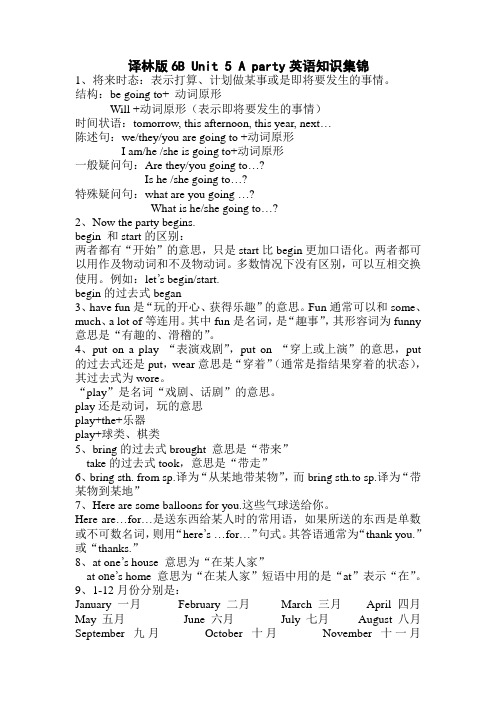
译林版6B Unit 5 A party英语知识集锦1、将来时态:表示打算、计划做某事或是即将要发生的事情。
结构:be going to+ 动词原形Will +动词原形(表示即将要发生的事情)时间状语:tomorrow, this afternoon, this year, next…陈述句:we/they/you are going to +动词原形I am/he /she is going to+动词原形一般疑问句:Are they/you going to…?Is he /she going to…?特殊疑问句:what are you going …?What is he/she going to…?2、Now the party begins.begin 和start的区别:两者都有“开始”的意思,只是start比begin更加口语化。
两者都可以用作及物动词和不及物动词。
多数情况下没有区别,可以互相交换使用。
例如:let’s begin/start.begin的过去式began3、have fun是“玩的开心、获得乐趣”的意思。
Fun通常可以和some、much、a lot of等连用。
其中fun是名词,是“趣事”,其形容词为funny 意思是“有趣的、滑稽的”。
4、put on a play “表演戏剧”,put on “穿上或上演”的意思,put 的过去式还是put,wear意思是“穿着”(通常是指结果穿着的状态),其过去式为wore。
“play”是名词“戏剧、话剧”的意思。
play还是动词,玩的意思play+the+乐器play+球类、棋类5、bring的过去式brought 意思是“带来”take的过去式took,意思是“带走”6、bring sth. from sp.译为“从某地带某物”,而bring sth.to sp.译为“带某物到某地”7、Here are some balloons for you.这些气球送给你。
(完整)译林英语6B知识点归纳,推荐文档

译林六年级下大纲Unit 1 The lion and the mouse单词quietly 大声地sadly难过地,伤心地happily开心地,高兴得some day一天loudly 大声地quickly迅速地,快地wake ... up吵醒,叫醒soon不久,很快large 大的weak弱的,软弱的strong强大的,强壮的cheer欢呼deep 深的sharp锋利的,尖的let ... go释放,放开just then就在那时mouse 老鼠walk by走过,路过from then on从那时起bite咬net 网pour ... into把……倒入hit打,击the next day第二天重点词组1. in the forest 在森林里2. walk by 走过;路过3. wake up 醒,醒来4. wake sb. up 把某人叫醒5. be angry with sb. 对某人生气6. the next day 第二天7. be angry at sth. 对某事生气8. want to do sth. 想要做某事9. want sb. to do sth. 要某人做某事10. some day 某一天11. say quietly 小声地说12. sit quietly 静静地坐着13. laugh loudly 大声地笑14. let sb. do sth. 让某人做某事15. catch the lion with a large net 用一口大网捉住狮子16. bite the net with sharp teeth 用锋利的牙齿咬网17. ask sadly 难过地问,伤心地问18. just then 就在那时19. say happily 开心地说20. from then on 从那时起21. become friends 成为朋友22. say excitedly 兴奋地说,激动地说23. make a study plan 制定学习计划24. It doesn’t matter. 没关系。
(译林版)6B Unit6 An interesting country知识归纳
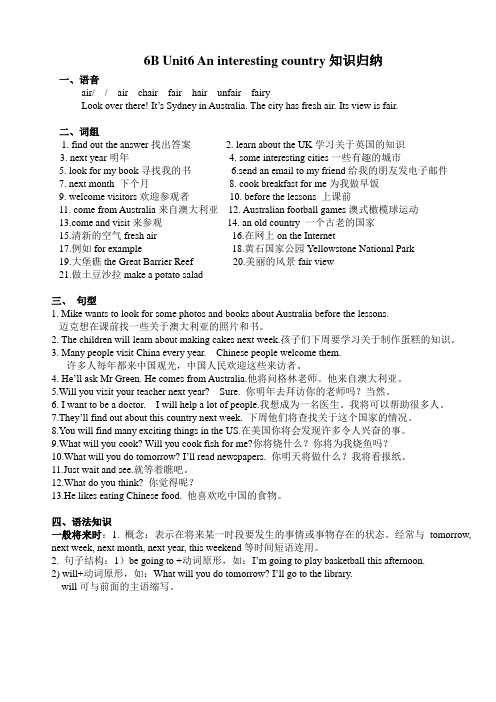
6B Unit6 An interesting country知识归纳一、语音air/ / air chair fair hair unfair fairyLook over there! It’s Sydney in Australia. The city has fresh air. Its view is fair.二、词组1. find out the answer找出答案2. learn about the UK学习关于英国的知识3. next year明年4. some interesting cities一些有趣的城市5. look for my book寻找我的书6.send an email to my friend给我的朋友发电子邮件7. next month 下个月8. cook breakfast for me为我做早饭9. welcome visitors欢迎参观者10. before the lessons 上课前11. come from Australia来自澳大利亚12. Australian football games澳式橄榄球运动e and visit来参观14. an old country 一个古老的国家15.清新的空气fresh air 16.在网上on the Internet17.例如for example 18.黄石国家公园Yellowstone National Park19.大堡礁the Great Barrier Reef 20.美丽的风景fair view21.做土豆沙拉make a potato salad三、句型1. Mike wants to look for some photos and books about Australia before the lessons.迈克想在课前找一些关于澳大利亚的照片和书。
2. The children will learn about making cakes next week.孩子们下周要学习关于制作蛋糕的知识。
译林六年级英语6A6B知识点

六年级上册英语6A6B单元知识点详解Unit 1 Do you want to watch a game show?1.祈使句的用法例如:Watch a movie with me.= Do ______ ______ a movie______.2.物品和花样滑冰的动词短语go ice-skating = ______ ______,例如:I want to go ice-skating. = I want to ______ ______ ______.draw pictures= ________ pictures. 例如:She is drawing pictures. = She is ______ ______.do kung fu=______ kung fu. 例如:They do kung fu very well. = They ______ ______ ______ very well.3.连系动词系表语4.询问人们是否想要做事Do you want to do…? 或Would you like to do…?5.询问人们想要购买物Can I help you? = What do you ______?或 What would you______to ______?例如:Can I help you? = What do you want to ______?Unit Do you want to go to a movie?1. 动词ing形式作宾语- Do you enjoy ______ kung fu? (do kung fu)- She can’t stand ______ teachers.(listen to)动词ing形式的动词作宾语时,加-ing后,构成动词-ing形式。
2.对所希望、期望的行为提问What would you like to do在询问对所希望、期望的行为时,常用句型:What would you like to do?例如:- __________ you like to do?- I’d like to play basketball.3. because引导的简单原因状语从句She doesn’t go to school _______ she is ill.-因为她病了,她没有去学校。
译林英语6B知识点归纳

1. in the forest 在森林里
2. walk by 走过;路过
3. wake up醒, 醒来
4. wake sb. up把某人叫醒
5. be angry with sb. 对某人生气
6. the next day第二天
7. be angry at sth.对某事生气
8. want to do sth. 想要做某事
15.
You shouldn’t go to bed late, Liu Tao. 刘涛,你不应该晚睡。
16.
Let me show you around our house. 让我带你参加一下我们的房子。
17.
They go into the living room. 他们走进客厅。
18.
They see a lot of books and toys on the floor. 他们看见很多书和玩具在地上。
重点句型
1.
The lion was angry and wanted to eat the mouse.这只狮子很生气想要吃那只老鼠。
2.
The lion bit the net with his sharp teeth.那只狮子用它的厉牙咬那个网。
3.
From then on, the lion and the mouse become friends.从那以后,这只狮子和那只老鼠成了朋友。
(7)疑问副词:就是用于引出特殊疑问句的when, where, why, how等。
副词的顺序
1.句末/尾时:方式状语-地点状语-时间状语:地点和时间状语内部的顺序由小到大。
如:I ate some noodles at school yesterday.昨天我在学校吃了一些面条。
新译林 6B Unit 4 Road safety 知识点梳理
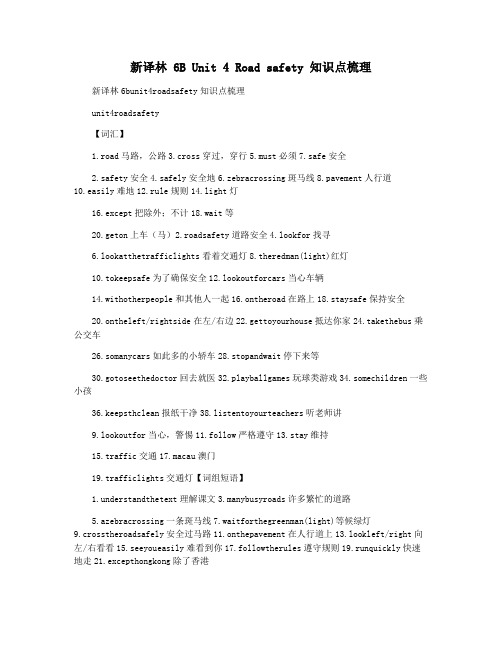
新译林 6B Unit 4 Road safety 知识点梳理新译林6bunit4roadsafety知识点梳理unit4roadsafety【词汇】1.road马路,公路3.cross穿过,穿行5.must必须7.safe安全2.safety安全4.safely安全地6.zebracrossing斑马线8.pavement人行道10.easily难地12.rule规则14.light灯16.except把除外;不计18.wait等20.geton上车(马)2.roadsafety道路安全4.lookfor找寻6.lookatthetrafficlights看着交通灯8.theredman(light)红灯10.tokeepsafe为了确保安全12.lookoutforcars当心车辆14.withotherpeople和其他人一起16.ontheroad在路上18.staysafe保持安全20.ontheleft/rightside在左/右边22.gettoyourhouse抵达你家24.takethebus乘公交车26.somanycars如此多的小轿车28.stopandwait停下来等30.gotoseethedoctor回去就医32.playballgames玩球类游戏34.somechildren一些小孩36.keepsthclean报纸干净38.listentoyourteachers听老师讲9.lookoutfor当心,警惕11.follow严格遵守13.stay维持15.traffic交通17.macau澳门19.trafficlights交通灯【词组短语】1.understandthetext理解课文3.manybusyroads许多繁忙的道路5.azebracrossing一条斑马线7.waitforthegreenman(light)等候绿灯9.crosstheroadsafely安全过马路11.onthepavement在人行道上13.lookleft/right向左/右看看15.seeyoueasily难看到你17.followtherules遵守规则19.runquickly快速地走21.excepthongkong除了香港23.gotoseetheiraunt去看他们的阿姨25.getonthebus上公交车27.goon继续29.stopagain又停下来31.besick生病了33.classroomrules班规35.gofast跑(走)得慢37.talkloudly大声骂人【语法】本单元学习的语法内容有两个:一是学习“must,mustn’t”的用法;二是复习“can,can’t,cannot”的用法。
新译林英语6B_全册知识点梳理

新译林英语6B_全册知识点梳理1.词汇:-单词:- travel: 旅行- explore: 探索- adventure: 冒险- destination: 目的地- journey: 旅程- experience: 经历- guide: 导游- souvenir: 纪念品- ancient: 古老的- modern: 现代的- famous: 著名的- delicious: 美味的- polite: 有礼貌的- crowded: 拥挤的- strict: 严格的- lazy: 懒惰的- noisy: 吵闹的- peaceful: 宁静的- busy: 忙碌的-短语和表达:- go sightseeing: 观光- take photos: 拍照- try local food: 尝试当地食物- learn about the local culture: 了解当地文化- go on an adventure: 进行冒险- a must-see: 必看的- get lost: 迷路- get around: 到处走走- relax and unwind: 放松和解压2.句型:- What’s your favorite place to visit? (你最喜欢去哪个地方?) - Why do you like it? (你为什么喜欢它?)- I like it because... (我喜欢它是因为...)- Have you ever been to...? (你去过...吗?)- Yes, I have. / No, I haven't. (是的,我去过。
/ 不,我没有。
)- Do you want to go there someday? (你想不想有一天去那里?) - Yes, I do. / No, I don't. (是的,我想去。
/ 不,我不想去。
) - It’s a great place for... (这是一个...的好地方。
新译林英语6B_全册知识点梳理重点词汇句型语法知识整理

新译林英语6B_全册知识点梳理重点词汇句型语法知识整理1.重点词汇- realize (v.) 意识到,认识到- pour (v.) 倾倒,涌出- cuisine (n.) 烹饪,烹调风格- spice (n.) 香料,调味品- chopsticks (n.) 筷子- source (v.) 获得,取得- blend (v.) 混合,融合- rely (v.) 依赖,依靠- introduce (v.) 介绍,引入- available (adj.) 可获得的,可用的- afford (v.) 负担得起- vinegar (n.) 醋- whip (v.) 打(鸡蛋、奶油等)- sprinkle (v.) 撒,洒- ingredient (n.) 原料,成分- banquet (n.) 宴会- host (n.) 主人,东道主2.重点句型- Can you realize your dream? 你能实现你的梦想吗?- It's important to pour the soup slowly. 慢慢地倒汤很重要。
- Chinese cuisine is known for its use of spices. 中国菜以其使用香料而闻名。
- Do you know how to use chopsticks? 你知道如何使用筷子吗?- Let's introduce our new classmate. 让我们来介绍一下我们的新同学。
- Is this book available in the library? 这本书在图书馆可以借阅吗?- I can't afford to buy a new car. 我买不起新车。
- Don't forget to sprinkle some sugar on top. 不要忘记在上面撒一些糖。
- The main ingredient for this dish is chicken. 这道菜的主要原料是鸡肉。
(完整word版)小学牛津英语译林版6B英语知识点

(完整word版)小学牛津英语译林版6B英语知识点Unit1 The lion and the mousemouse复数老鼠mice 鼠标mousesbig,large区不large:常指面积或范围大,有广大和众多的含义,其反义词是small。
large 比较正式。
big:常指程度,规模,容积,分量,数量大,含有庞大、笨重的意思,还可表示“伟大,重要”之意,其反义词是little,big较为口语化wake up:up是副词,别可后接代词,代词放中间,名称中间后面都能够放。
the next day 翌日,是指某个特定时刻的后一天,既可指过去,也可指未来tomorrow是指从今天向后的一天,即改日some day 表示未来别确定的某一天,表示未来的时刻状语,所以时态用普通未来时just then 就在那时,表示过去的时刻状语,所以时态用普通过去时from then on 从那时起,表示过去的时刻状语,所以时态用普通过去时from now on 从今以后,表示未来的时刻状语,所以时态用普通未来时副词接在动词后面speak loudly形容词接在名词前面或be动词后面作表语the old manwalk by走过路过let...go 释放敞开pour...into把......倒入in the forest 在森林里large and strong又大又壮so small and weak 那么小和弱let sb. do 让某人干某事well done 干得好get out from the net破网而出become friends变成朋友cheer for...为...而欢呼be good at ...=do well in...擅长in the ground在地上in the hole在洞里look sad看起来伤感with his teeth 用他的牙齿catch(caught)...with用...捉住...have an idea有一具主意(想法)have a good(bad) idea 反义词strong 与weak(同音词week) bite过去式bit hit过去式hitunit2 good habits宾语补脚语:英语中,有点及物动词后接宾语时,还需要加一具词或短语来补充讲明宾语的事情,如此的词或短语叫做宾语补脚语。
译林版6B语法知识归类
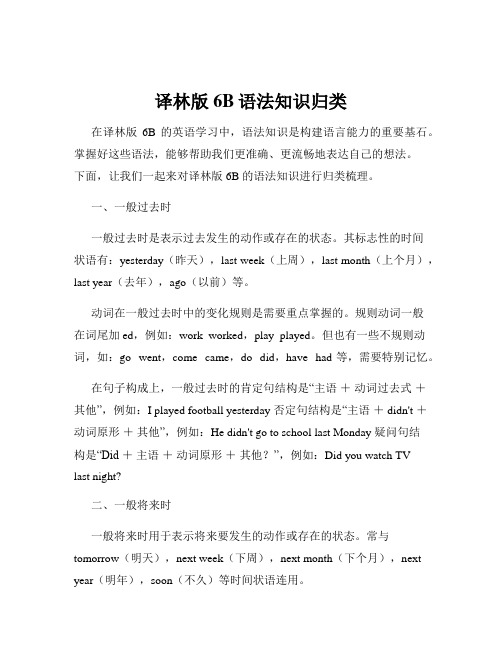
译林版6B语法知识归类在译林版6B 的英语学习中,语法知识是构建语言能力的重要基石。
掌握好这些语法,能够帮助我们更准确、更流畅地表达自己的想法。
下面,让我们一起来对译林版 6B 的语法知识进行归类梳理。
一、一般过去时一般过去时是表示过去发生的动作或存在的状态。
其标志性的时间状语有:yesterday(昨天),last week(上周),last month(上个月),last year(去年),ago(以前)等。
动词在一般过去时中的变化规则是需要重点掌握的。
规则动词一般在词尾加 ed,例如:work worked,play played。
但也有一些不规则动词,如:go went,come came,do did,have had 等,需要特别记忆。
在句子构成上,一般过去时的肯定句结构是“主语+动词过去式+其他”,例如:I played football yesterday 否定句结构是“主语+ didn't +动词原形+其他”,例如:He didn't go to school last Monday 疑问句结构是“Did +主语+动词原形+其他?”,例如:Did you watch TVlast night?二、一般将来时一般将来时用于表示将来要发生的动作或存在的状态。
常与tomorrow(明天),next week(下周),next month(下个月),next year(明年),soon(不久)等时间状语连用。
一般将来时有两种常见的表达形式:“be going to +动词原形”和“will +动词原形”。
“be going to”表示计划、打算做某事,例如:I'm going to visit my grandparen ts this weekend “will”则更侧重于表示意愿或对未来的预测,例如:It will be sunny tomorrow三、现在进行时现在进行时表示正在进行的动作。
完整版)译林英语6BU8考点精练

完整版)译林英语6BU8考点精练1.“不定式:to+动词原形”的2种形式1)【易错】--What do you want to do in the future?--I want to play in the World Cup.A。
be。
playingB。
do。
playC。
be。
play2)What do Kitty and Alice want to be。
They want to be policemen.A。
does。
policemenB。
do。
policemenC。
do。
policeman2.表示“人”的两种词尾1)【易错】Is that woman a pianist。
Yes。
Look。
She is playing at the concert。
A。
XXX2)What does your brother want to be。
He wants to be a dentist.A。
XXX3)XXX.4)【易错】Does he know the name (read)?3.动名词做主语【不表示“现在进行”】1)【易错】To make my dream come true。
I will study hard.A。
XXX make2)Walking on the Mars is my dream.3)Eating too many sweets is bad for our XXX.4.复“动配副”“be配形”1)XXX.2)How is music。
Music can make people happy.5.本课的一些短语:play the piano。
play the guitar。
be good at。
want to be。
dream of。
make one's dream come true。
be bad for.Miss Li asks children about their dreams.XXX and often end up going to see the dentist.She is good at writing and wants to write XXX.XXX will have swimming lessons.1) There will be a lot of fun at the party.2) Listen。
[译林版]6B Unit4 知识点精心梳理
![[译林版]6B Unit4 知识点精心梳理](https://img.taocdn.com/s3/m/f881fb352379168884868762caaedd3383c4b5d4.png)
6B Unit4 Road safety 知识点梳理一、词组:Story time:1. help you understand the text 帮你理解课文2. many busy roads in the city 城市里的繁忙街道3. cross them safely 安全的通过它们4. a zebra crossing 斑马线5. look at the traffic lights 看交通灯6. wait for the green man 等绿灯7. cross the road 穿过马路8. a zebra crossing near you在你的附近斑马线9. to keep safe 为了保持安全10. wait on the pavement 在人行道上等11. look out for cars 小心汽车12. first look left 先看左边13. cross the road with other people 和其他人一起穿过马路14. see you easily 很容易看到你15. some children 一些孩子16. play football on the road 在马路上踢足球17. follow the rules 遵守规则18. stay safe on the road 在马路上保持安全19. run quickly on the road 在马路上跑得很快20. cross a busy road safely 安全通过繁忙的马路21. before we cross the road 在我们通过马路之前Culture time:1.in the United Kingdom 在英国2. drive on the left side of the road 在马路的左边开车3.People’s Republic of China 中国4. right side of the road 马路的右边5. except Macau 除了澳门Cartoon time:1. go to see their aunt 去看他们的阿姨2. get to your house 到达你家3.take the bus 乘公交车4. get on the bus 上公交车5.so many cars 那么多汽车6.a red light 一个红灯7.go on 继续8.stop again 再次停下来9.some elephants 一些大象10.stop and wait 停下来等Checkout time:1. go to see the doctor 去看病2.classroom rules 教室规则3.run in the classroom 在教室里跑4. keep your desk clean and tidy 保持你的桌子干净整洁5.play ball games 玩球类游戏6.talk loudly 大声地交谈7.listen to your teachers in class在课堂上听你老师的话8.need to read some words 需要读些单词9. in a sentence 在一个句子里10.more loudly 更加大声二、句型:1. There are many busy roads in the city. 在城市里有很多繁忙的街道2. How can you cross the road safely? You must first look left, then right and then left again你怎样才能安全地穿过马路?你必须首先看左边,接着右边,然后再左边。
新译林英语6B_全册知识点梳理(重点词汇、句型、语法知识整理)

新译林英语6B_全册知识点梳理(重点词汇、句型、语法知识整理) 编辑整理:尊敬的读者朋友们:这里是精品文档编辑中心,本文档内容是由我和我的同事精心编辑整理后发布的,发布之前我们对文中内容进行仔细校对,但是难免会有疏漏的地方,但是任然希望(新译林英语6B_全册知识点梳理(重点词汇、句型、语法知识整理))的内容能够给您的工作和学习带来便利。
同时也真诚的希望收到您的建议和反馈,这将是我们进步的源泉,前进的动力。
本文可编辑可修改,如果觉得对您有帮助请收藏以便随时查阅,最后祝您生活愉快业绩进步,以下为新译林英语6B_全册知识点梳理(重点词汇、句型、语法知识整理)的全部内容。
6下 Unit 1 The lion and the mouse知识点梳理一词组1. in the forest 在森林里 2。
walk by 走过;路过3. wake up 醒,醒来4。
wake sb up 把某人叫醒5. be angry with sb 对某人生气 6。
the next day 第二天7. be angry at sth 对某事生气 8. want to do sth 想要做某事9. want sb to do sth 要某人做某事 10。
some day 某一天11。
say quietly 小声地说12。
sit quietly 静静地坐着13. laugh loudly 大声地笑 14. let sb do sth 让某人做某事15。
catch the lion with large net 用一口大网捉住狮子16。
bite the net with sharp teeth 用锋利的牙齿咬网17。
ask sadly 难过地问,伤心地问 18。
just then 就在那时19. say happily 开心地说, 20。
from then on 从那时起21。
become friends 成为朋友 22。
- 1、下载文档前请自行甄别文档内容的完整性,平台不提供额外的编辑、内容补充、找答案等附加服务。
- 2、"仅部分预览"的文档,不可在线预览部分如存在完整性等问题,可反馈申请退款(可完整预览的文档不适用该条件!)。
- 3、如文档侵犯您的权益,请联系客服反馈,我们会尽快为您处理(人工客服工作时间:9:00-18:30)。
译林六年级下大纲Unit 1 The lion and the mouse单词quietly 大声地sadly难过地,伤心地happily开心地,高兴得some day一天loudly 大声地quickly迅速地,快地wake ... up吵醒,叫醒soon不久,很快large 大的weak弱的,软弱的strong强大的,强壮的cheer欢呼deep 深的sharp锋利的,尖的let ... go释放,放开just then就在那时mouse 老鼠walk by走过,路过from then on从那时起bite咬net 网pour ... into把……倒入hit打,击the next day第二天重点词组1. in the forest 在森林里2. walk by 走过;路过3. wake up 醒,醒来4. wake sb. up 把某人叫醒5. be angry with sb. 对某人生气6. the next day 第二天7. be angry at sth. 对某事生气8. want to do sth. 想要做某事9. want sb. to do sth. 要某人做某事10. some day 某一天11. say quietly 小声地说12. sit quietly 静静地坐着13. laugh loudly 大声地笑14. let sb. do sth. 让某人做某事15. catch the lion with a large net 用一口大网捉住狮子16. bite the net with sharp teeth 用锋利的牙齿咬网17. ask sadly 难过地问,伤心地问18. just then 就在那时19. say happily 开心地说20. from then on 从那时起21. become friends 成为朋友22. say excitedly 兴奋地说,激动地说23. make a study plan 制定学习计划24. It doesn’t matter. 没关系。
25. the boy over there 那边的那个男孩26. play table tennis happily开心地打乒乓球27. cheer for sb. loudly大声地为某人欢呼28. be excited at / about…对……很兴奋/激动29. in the ground 在地下30. reach the apple 够得着那个苹果31. reach the park 到达公园32. have an idea 有一个主意33. bring some water quickly很快拿来水34. pour…into….把……倒入……35. Well done. 干得很好。
做的不错。
36. so many balls 如此多的球37. so much bread 如此多的面包38. take … to… 把…….带到…….39. become happy 变得很开心40. get out 出来,出去重点句型1. The lion was angry and wanted to eat the mouse.这只狮子很生气想要吃那只老鼠。
2. The lion bit the net with his sharp teeth.那只狮子用它的厉牙咬那个网。
3. From then on, the lion and the mouse become friends.从那以后,这只狮子和那只老鼠成了朋友。
4. The next day, two men caught the lion with a large net.第二天,两个男人用一张大网抓住了那只狮子。
5. The lion bit the net with his sharp teeth, but that did not help.那只狮子用他的厉牙咬网,但是那无济于事。
6. Here comes the lion.狮子来了。
7. One day, a mouse walked by and woke the lion up.一天,一只老鼠从狮子身边经过,弄醒了狮子。
8. The mouse said quietly. 老鼠小声地说。
9. “How can I get out ?” asked the lion sadly.“ 我怎么能出去呢?”狮子难过地问。
10. Soon, the mouse made a big hole in the net with his teeth.很快,老鼠用他的牙齿把网咬了一个大洞。
语法1、常见副词well: study well学习好 skate well滑冰好(注: well 若表示形容词,则意思为身体好)fast: run fast 跑得快 swim fast游泳快loudly: laugh loudly 大声得笑 speak loudly 大声地讲sadly: ask sadly 伤心地问 cry loudly 伤心地哭happily: sing happily 开心地唱 talk happily 开心的谈话carefully: listen carefully 认真地听 walk carefully 小心地走angrily: ask angrily 愤怒地问quietly: do one’s homework quietly安静地做作业sleep quietly 安静地睡quickly: bring some water quickly 迅速地拿些水来beautifully: dance beautifully 唱歌唱得美★系表结构: (注意不用副词)be, feel, look, sound, smell, become, keep + 形容词★fast ,hard ,high,early,late, 形容和副词同形2、一般过去式常用的时间状语ago / long long ago / yesterday / the day before yesterday in 2014 / just now(刚才) /at the age of 5(在五岁时) / once upon a time从前 / one day / last week, year, night, month, from then on3、speak ,talk,say,tell区别speak强调方式;say强调内容;tell后一定要加人或讲的内容; talk强调连续说Unit 2 Good habit单词late 迟,晚tidy干净的,整齐的bad不好的,坏的last night昨夜sleepy困的,困倦的finish完成go into走进,走入never从不fast 快地slowly慢速地badly差地,不好habit习惯put ... in order 把……整理得井井有条重点词组1. many good habits 很多好习惯2. get up early 早起3. go to bed late 晚睡4. brush one’s teeth 刷牙5. put sth. in order 把东西摆放有序6. finish one’s homework完成家庭作业7. listen to the teacher 听老师的话 8. at school 在学校9. keep the room clean and tidy 保持房间干净整洁10. do well 干得好 11. some bad habits 一些坏习惯12. feel sleepy 感到困倦 13. know sb. well 对某人很了解14. walk fast 快速地走 15. Pick one! 选一个16. show sb. around sp. 带某人参观某地 17. go into 进入重点句型语法副词的分类(1) 时间副词:常见的有now, then, soon, ago, lately, later, before, early, today, tomorrow, yesterday, tonight, suddenly, still, already, just 等。
(2) 地点副词:常见的有here, there, up, down, away, nearby, home, upstairs, downstairs 等。
1. He has many good habits. 他有许多好习惯。
2. He gets up early in the morning and never goes to bed late.他早上早起,从不晚睡。
3. He brushes his teeth in the morning and before bedtime. 他早上和睡前刷牙。
4. At home, Wang Bing always puts his things in order.在家,王兵总是把他的东西摆放有序。
5. He usually finishes his homework before dinner. 他经常在晚餐前晚餐作业。
6. He listens to his teachers at school. 他在学校听老师们的话。
7. He also does well at home. 他在家也做得很好。
8. He keeps his room clean and tidy. 他保持他的房间干净和整洁。
9. He also helps his parents. 他也帮他的父母。
10. He often does his homework late at night and does not go to bed early.他经常晚做作业,晚上不早睡。
11 He sometimes feels sleepy in the morning. 有时早上他感到困倦。
12 Wang Bing knows Liu Tao well. 王兵对刘涛很了解。
13 Did you go to bed late last night? 你昨天晚上睡觉晚吗?14 I’m not sleepy. I can walk fast. 我不困,我可以走得很快。
15 You shouldn’t go to bed late, Liu Tao. 刘涛,你不应该晚睡。
16 Let me show you around our house. 让我带你参加一下我们的房子。
17 They go into the living room. 他们走进客厅。
